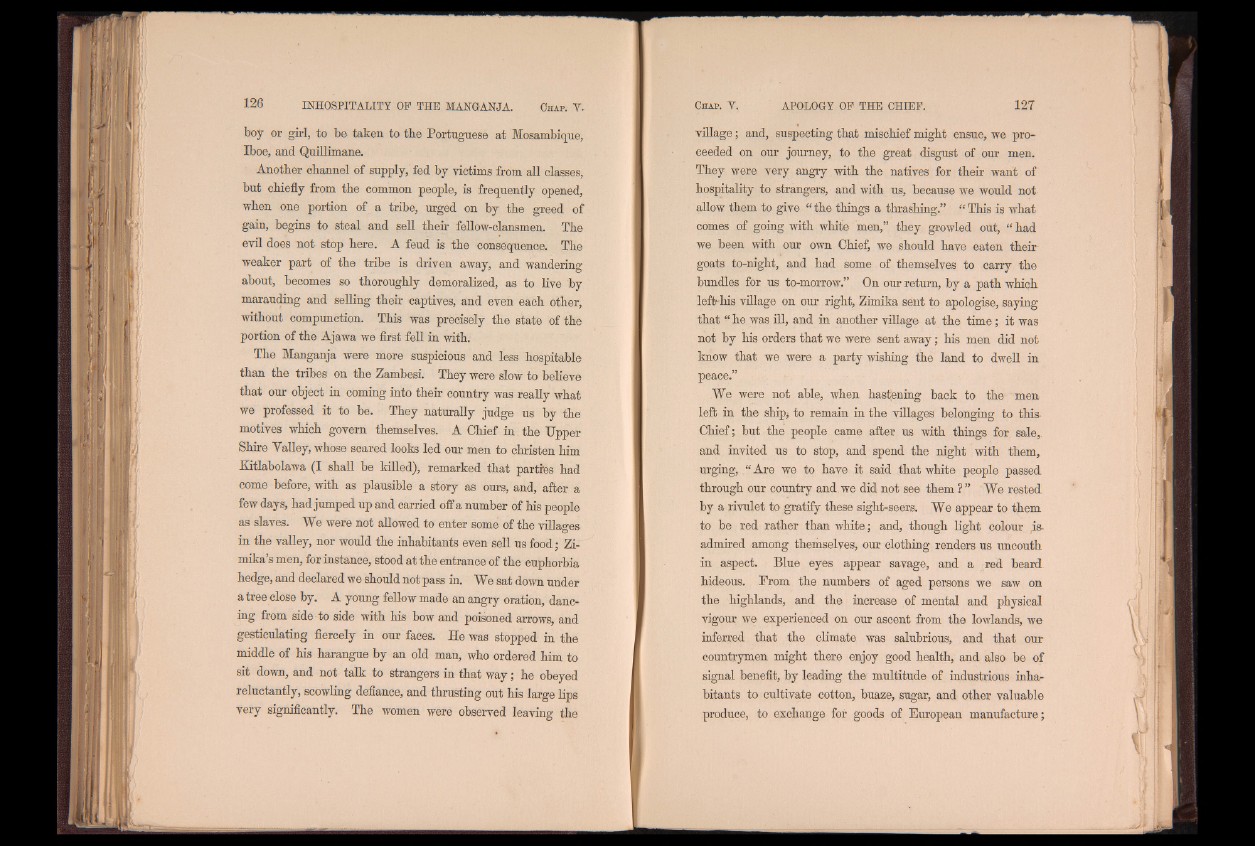
boy or girl, to be taken to the Portuguese at Mosambique,
Iboe, and Quillimane.
Another channel of supply, fed by victims from all classes,
but chiefly from the common people, is frequently opened,
when one portion of a tribe, urged on by the greed of
gain, begins to steal and sell their fellow-clansmen. The
evil does not stop here. A feud is the consequence. The
weaker part of the tribe is driven away, and wandering
about, becomes so thoroughly demoralized, as to live by
marauding and selling their captives, and even each other,
without compunction. This was precisely the state of the
portion of the Ajawa we first fell in with.
The Manganja were more suspicious and less hospitable
than the tribes on the Zambesi. They were slow to believe
that our object in coming into their country was really what
we professed it to be. They naturally judge us by the
motives which govern themselves. A Chief in the TJpper
Shire Yalley, whose scared looks led our men to christen him
Kitlabolawa (I shall be killed), remarked that parties had
come before, with as plausible a story as ours, and, after a
few days, had jumped up and carried off a number of his people
as slaves. We were not allowed to enter some of the villages
in the valley, nor would the inhabitants even sell us food; Zi-
mika’s men, for instance, stood at the entrance of the euphorbia
hedge, and declared we should not pass in. We sat down under
a tree close by. A young fellow made an angry oration, dancing
from side to side with his bow and poisoned arrows, and
gesticulating fiercely in our faces. He was stopped in the
middle of his harangue by an old man, who ordered him to
sit down, and not talk to strangers in that way; he obeyed
reluctantly, scowling defiance, and thrusting out his large lips
very significantly. The women were observed leaving the
village; and, suspecting that mischief might ensue, we proceeded
on our journey, to the great disgust of our men.
They were very angry with the natives for their want of
hospitality to strangers, and with us, because we would not
allow them to give “ the things a thrashing.” “ This is what
comes of going with white men,” they growled out, “ had
we been with our own Chief, we should have eaten their
goats to-night, and had some of themselves to carry the
bundles for us to-morrow.” On our return, by a path which
left-his village on our right, Zimika sent to apologise, saying
that “ he was ill, and in another village at the time; it was
not by his orders that we were sent away; his men did not
know that we were a party wishing the land to dwell in
peace.”
We were not able, when hastening back to the men
left in the shipj to remain in the villages belonging to this
Chief; but the people came after us with things for sale,,
and invited us to stop, and spend the night with them,
urging, "Are we to have it said that white people passed
through our country and we did not see them ?” We rested
by a rivulet to gratify these sight-seers. We appear to them
to be red rather than white; and, though light colour ,is-
admired among themselves, our clothing renders us uncouth
in aspect. Blue eyes appear savage, and a red beard
hideous. From the numbers of aged persons we saw on
the highlands, and the increase of mental and physical
vigour we experienced on our ascent from the lowlands, we
inferred that the climate was salubrious, and that our
countrymen might there enjoy good health, and also be of
signal benefit, by leading the multitude of industrious inhabitants
to cultivate cotton, buaze, sugar, and other valuable
produce, to exchange for goods of European manufacture;